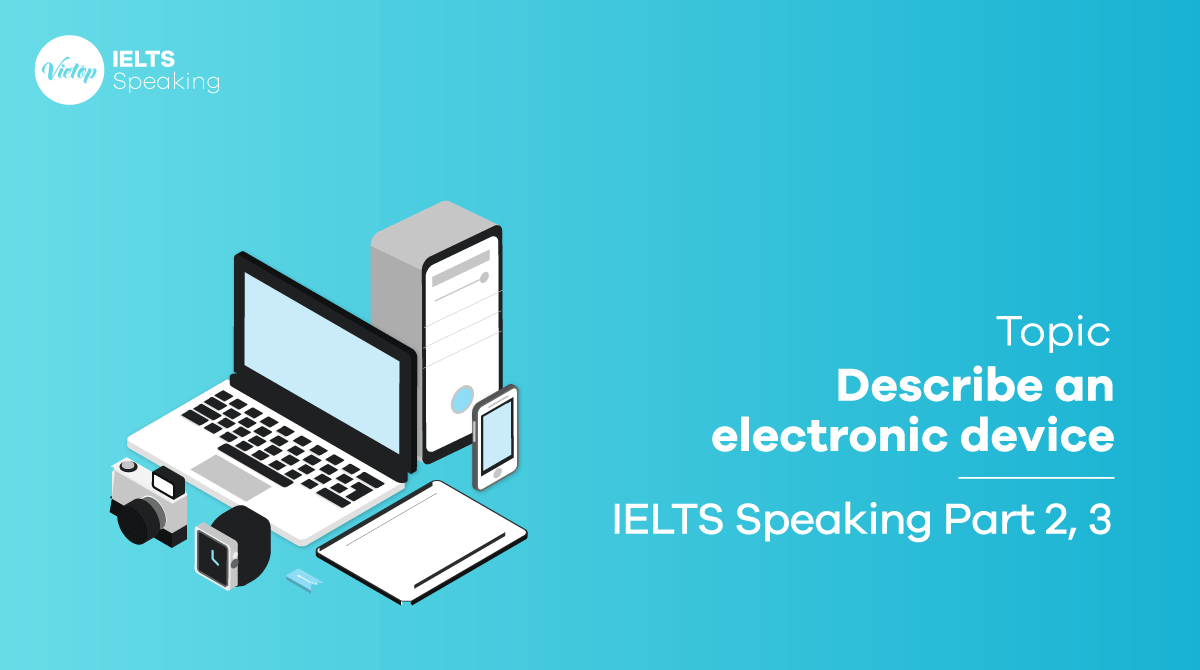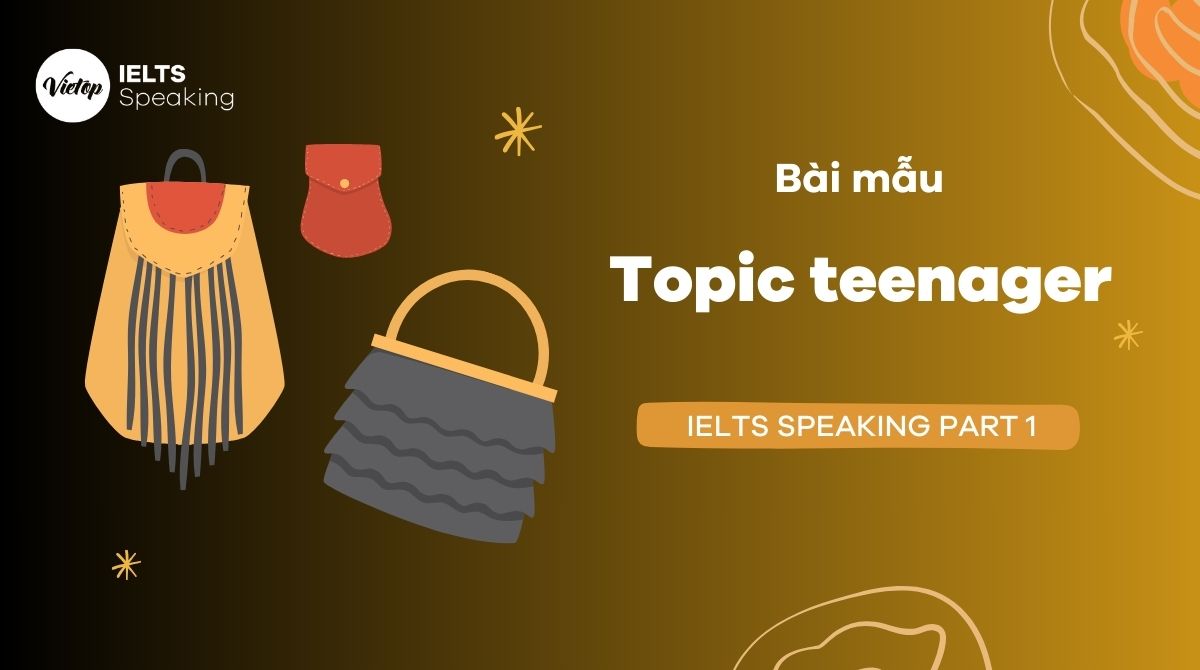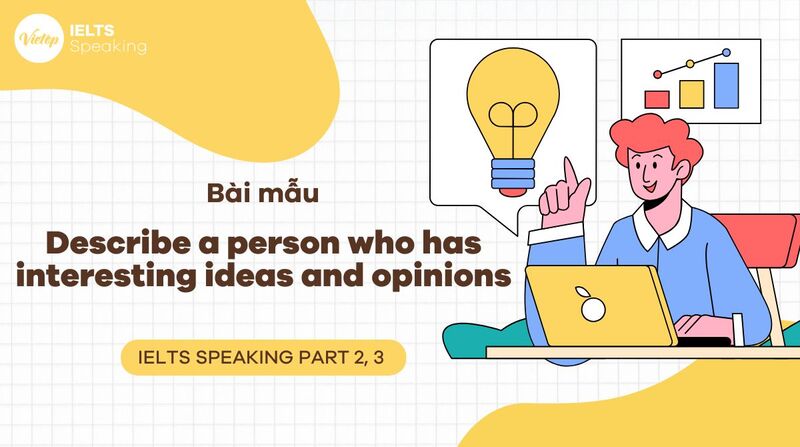Hôm nay, Vietop English giới thiệu bài mẫu câu trả lời IELTS Speaking part 2, 3: Describe an electronic device. Đề bài này thuộc dạng yêu cầu thí sinh mô tả một món đồ, các bạn nên chú ý sử dụng những từ vựng, cấu trúc phù hợp cũng như canh chuẩn thời gian khi nói để không bị quá dài dòng nhé!
Đề bài describe an electronic device
Trước hết, bạn có thể gặp đề bài xoay quanh việc tả lại một thiết bị điện tử như sau:
| Describe an electronic device. You should say: How long you have used it How often you have used it What you have used it for And explain why you use it often |

Từ vựng describe an electronic device
Dưới đây là một số từ vựng hữu ích mà bạn có thể sử dụng trong phần IELTS Speaking part 2, 3: Describe an electronic device.
Adapter (n): chuyển đổi, cục sạc
E.g.: I need to buy an adapter for my laptop charger.
Antenna (n): ăng-ten
E.g.: The TV antenna needs to be adjusted to get a better signal.
Battery (n): pin
E.g.: The battery in my phone needs to be replaced.
Bluetooth (n): Bluetooth
E.g.: I connected my phone to the speaker using Bluetooth.
Button (n): nút bấm
E.g.: Press the button to turn on the device.
Cable (n): dây cáp
E.g.: I need to buy a new cable to connect my phone to my computer.
Charger (n): cục sạc
E.g.: Don’t forget to bring your phone charger with you.
Circuit (n): mạch điện
E.g.: The circuit board in my computer is damaged.
Console (n): máy chơi game
E.g.: My brother loves playing games on his console.
Display (n): màn hình
E.g.: The display on my phone is cracked.
Download (v): tải về
E.g.: I need to download the software to use the new device.
Function (n): chức năng
E.g.: The device has many functions that I haven’t explored yet.
Gamepad (n): tay cầm chơi game
E.g.: I prefer using a gamepad to play games on my computer.
Gigabyte (GB) (n): gigabyte
E.g.: The device has a storage capacity of 64 gigabytes.
Headphones (n): tai nghe
E.g.: I use headphones to listen to music on my phone.
Interface (n): giao diện
E.g.: The interface of the device is user-friendly.
Keyboard (n): bàn phím
E.g.: I prefer using a keyboard to type on my computer.
Megapixel (MP) (n): megapixel
E.g.: The device has a camera with 12 megapixels.
Microphone (n): microphone
E.g.: The microphone on my computer isn’t working.
Mouse (n): chuột máy tính
E.g.: I use a mouse to navigate on my computer.
Printer (n): máy in
E.g.: I need to buy a new printer for my home office.
Processor (n): bộ xử lý
E.g.: The device has a powerful processor that can handle complex tasks.
Screen (n): màn hình
E.g.: The screen on the device is large and clear.
Software (n): phần mềm
E.g.: I need to install the software to use the new device.
Speaker (n): loa
E.g.: The device has a built-in speaker for audio output.
Storage (n): bộ nhớ
E.g.: The device has a storage capacity of 128 gigabytes.
Touchscreen (n): màn hình cảm ứng
E.g.: I prefer using a device with a touchscreen.
USB (n): cổng USB
E.g.: I need to connect the device to my computer using a USB cable.
Video call (n): cuộc gọi video
E.g.: I use the device to make video calls with my family.
Wi-Fi (n): Wi-Fi
E.g.: I connect to the internet using Wi-Fi on my device.
Xem thêm:
Bài mẫu IELTS Speaking part 2: Describe an electronic device
Gợi ý dàn bài Describe an electronic device
Mở bài – giới thiệu sơ lượt
Ở phần mở đầu, bạn có thể giới thiệu sơ qua về thiết bị mà mình sẽ tả lại. Chú ý tránh việc “mở bài” dài dòng như trong văn viết vì ta chỉ có khoảng 2 phút để nói trong IELTS Speaking Part 2 mà thôi.
Thân bài – mô tả
Mô tả, kể lại câu chuyện theo hướng dẫn của phần “you should say”:
- Bạn đã dùng thiết bị đó khi nào
- Bạn thường dùng nó không
- Bạn dùng nó để làm gì
- Giải thích vì sao bạn thường dùng nó
Kết bài – tóm lược lại
Với phần kết thúc, hãy tóm lược lại mọi thứ trong 1, 2 câu ngắn gọn. Bạn có thể bỏ qua phần này nếu không đủ thời gian. Nhưng hãy chú ý truyền tải toàn bộ câu chuyện đầy đủ theo yêu cầu đề bài.
Xem thêm bài mẫu Speaking:
- Bài mẫu topic Outdoor activities – IELTS Speaking part 1, 2, 3
- Bài mẫu topic Celebrities – IELTS Speaking part 1, 2, 3
- Bài mẫu topic Culture – IELTS Speaking part 1, 2, 3
Bài mẫu Describe an electronic device
Mời bạn cùng nghe Podcast bài mẫu Part 2 của Vietop English nhé:
I would like to talk about my laptop, which I have been using for the past three years. I use it almost every day, for both personal and professional purposes.
I use my laptop for a variety of tasks such as browsing the internet, watching movies, listening to music, and completing work assignments. As a freelance writer, my laptop is essential for my work as I use it to research, write, and edit articles. Additionally, I use it to communicate with clients and submit my work.
One of the reasons why I use my laptop often is because of its portability. I can take it with me wherever I go, whether it’s to a coffee shop or to a client meeting. I also appreciate the convenience of having all my work documents and personal files in one place. The laptop’s large display and fast processor make it easy for me to multitask and work efficiently. Moreover, the laptop has become a source of entertainment for me. I use it to stream movies and TV shows, listen to music, and play games. It has become a daily companion that I rely on for both work and leisure.
My laptop has been an important device for me for the past three years. I use it regularly for both working and entertaining. Its portability, convenience, and efficiency have made it an indispensable tool in my daily life.
- Freelance (adj): làm tự do
- Essential (adj): cần thiết
- Portability (n): tính di động
- Convenience (n): tiện lợi
- Multitask (v): đa nhiệm
- Efficiency (n): hiệu suất
- Leisure (n): giải trí
- Indispensable (adj): không thể thiếu
Xem thêm:
Bài mẫu IELTS Speaking part 3: Describe an electronic device

Mời bạn cùng nghe Podcast bài mẫu Part 3 của Vietop English nhé:
Bạn đang ấp ủ khát vọng nâng cao kỹ năng IELTS nhưng vẫn chưa tìm được phương pháp thực sự hiệu quả? Để nâng cao khả nnawg tiếng anh của bạn trước hết bạn nên làm được các dạng bài IELTS Speaking part 2, 3 với chủ đề Describe an electronic device. Để làm được các dạng bài trên tốt và nhanh chóng bạn nên chuẩn bị cho bản thân các kỹ năng như nói, viêt, đọc và nghe.
Với khoá học IELTS 5.0 – 6.5 tại Vietop English. Sau khi hoàn thành khoá học bạn sẽ dễ dàng nắm bắt được các dạng câu hỏi, hoàn thành bài Task 1 (tối thiểu 150 từ) trong vòng 20 phút dưới các dạng bài như Change-over-time, Comparison, Maps và Process, đảm bảo tuân thủ các yêu cầu và điều kiện nghiêm ngặt của phòng thi. Vì vậy, hãy đăng ký luyện thi IELTS cũng với chúng mình. Chần chờ gì nữa đăng ký khoá học ngay hôm nay nào.
When should parents allow their children to have a phone?
I think parents should let their children keep a phone when they are mature enough to handle the responsibility that comes with it. The age at which this happens may vary depending on the child’s maturity level. Parents should also consider the child’s specific needs, such as whether they need a phone to stay in touch with their parents or for emergencies. Ultimately, it is up to the parents to determine when their child is ready for a phone.
- Responsibility (n): trách nhiệm
- Vary (v): khác nhau
- Maturity (n): sự trưởng thành
- Consider (v): xem xét
- Emergencies (n): trường hợp khẩn cấp
- Determine (v): quyết định
Xem ngay:
- Bài mẫu Describe a TV Show that made you laugh a lot
- Cách phát âm ed trong tiếng Anh chuẩn nhất
Can phones be disruptive sometimes?
Yes, phones can be quite disruptive at times. For example, when people use their phones during important meetings or conversations, it can be disrespectful and distracting. Additionally, excessive phone use can lead to decreased productivity and social isolation. It is important for individuals to recognize when their phone use is becoming disruptive and to make an effort to limit it in certain situations.
- Disruptive (adj): gây gián đoạn
- Important (adj): quan trọng
- Disrespectful (adj): thiếu tôn trọng
- Distracting (adj): phân tâm
- Excessive (adj): quá mức
- Productivity (n): năng suất
- Social isolation (n): cô lập xã hội
- Recognize (v): nhận ra
- Limit (v): giới hạn
Are people often impolite while using their phones?
Unfortunately, in my point of view, people can be disrespectful while using their phones. For example, they may talk loudly in public places, use their phone during meals, or text while driving. These actions can be seen as impolite and can create a negative impact on others. It is important for individuals to be mindful of their phone use and to consider the feelings of those around them.
- Loudly (adv): to tiếng
- Public places (n): những nơi công cộng
- Impolite (adj): thiếu lịch sự
- Negative impact (n): tác động tiêu cực
- Mindful (adj): chú ý
- Consider (v): cân nhắc
- Feelings (n): cảm xúc
Trên đây là bài mẫu IELTS Speaking part 2, 3: Describe an electronic device, hy vọng bài viết sẽ là nguồn tham khảo tốt cho các bạn trong việc học và chuẩn bị cho kỳ thi IELTS. Chúc các bạn học tốt!









